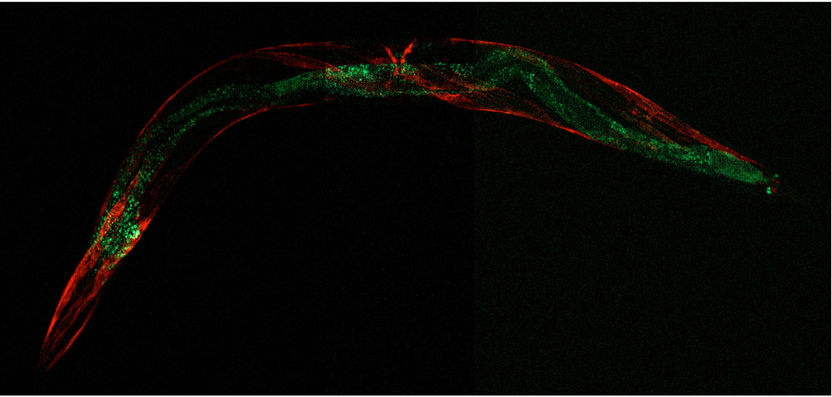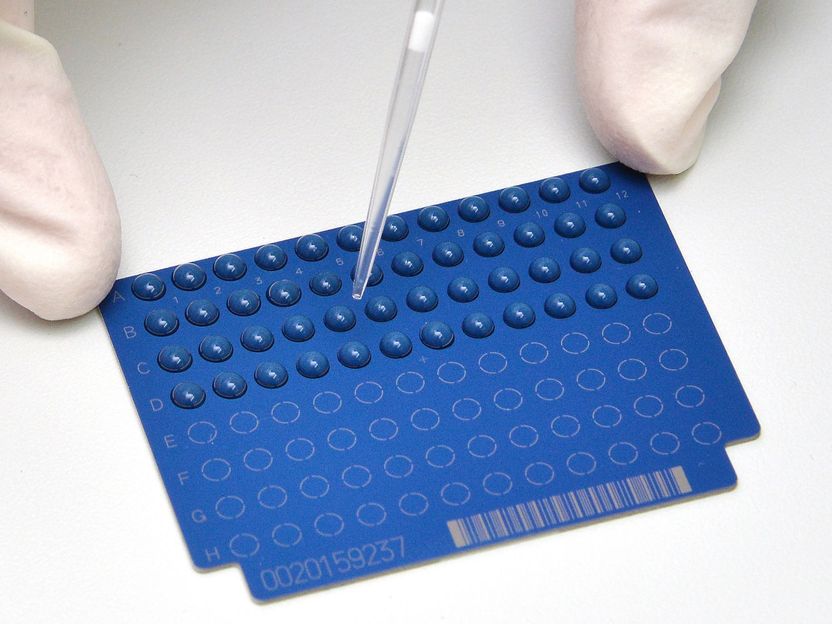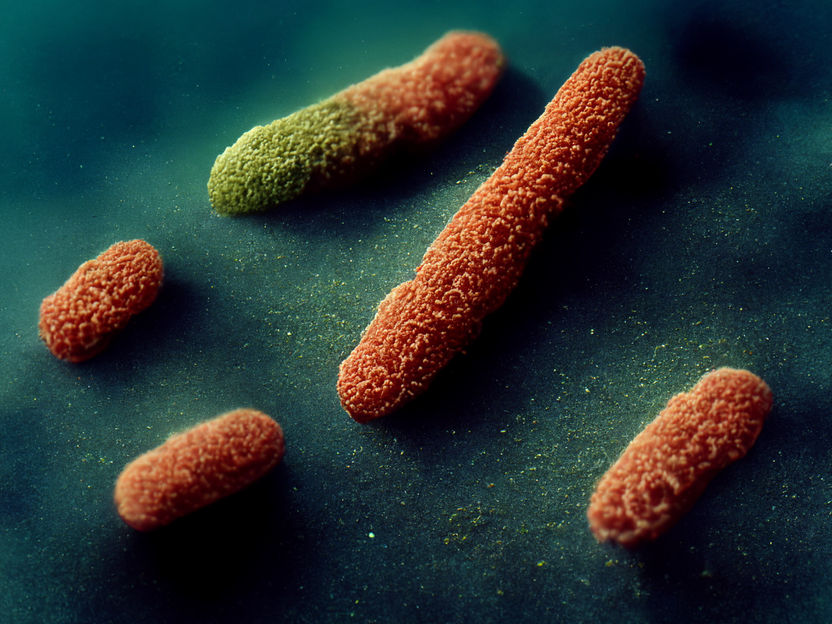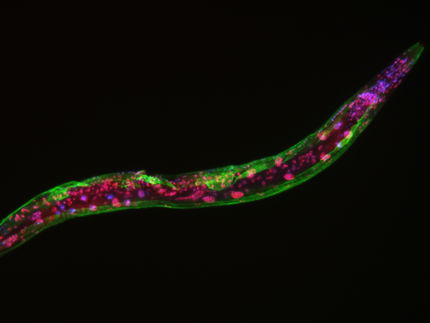What mechanisms ensure healthy aging?
Insights into healthy aging mechanisms from the roundworm
Median life expectancy of our society is still increasing which leads us to the question: how can we extend healthy aging? This is being investigated on a molecular level in the model organism Caenorhabditis elegans, a transparent round worm with a size of about 1 mm. It is widely used in research on aging processes due to conserved genes and age-associated features in comparison to humans. Up to now, researchers know that interventions that promote healthy aging are typically associated with increased robustness and stress resistance, which is the ability to better prevent harmful influences. Paradoxically, reducing the activity of core biological processes such as mitochondrial or insulin metabolism promotes the expression of adaptive responses, which in turn increase animal longevity and resistance to stress.

C. elegans’ mitochondria in muscles (red) and intestine (green) are visualized through the expression of mitochondrial proteins tagged to fluorescent markers and expressed under different promoters.
A. Schiavi, AG Ventura/IUF
In a study that was recently published in EMBO Reports, Dr. Natascia Ventura’s research group from IUF and HHU in Düsseldorf, Germany, investigated for the first time the relation between the extended C. elegans lifespan elicited by reducing mitochondrial functionality and resistance to genotoxic (gene damage) stress e.g. by irradiation and chemical substances. They found that reducing mitochondrial activity during development confers germline (cells, whose genetic material can be passed on to offsprings) resistance to DNA damage-induced cell cycle arrest and apoptosis (cell death). Interestingly, they showed that although this mechanism requires somatic cells (all other, non-germline cells which are most body cells), it is uncoupled from those required for somatic robustness. Specifically, the C. elegans homologs of the BRCA1 and BARD1 tumor suppressor genes, brc-1 and brd-1, were identified as mediators of the anti-apoptotic effect but dispensable for lifespan extension upon mitochondrial stress. The study was conducted in cooperation with colleagues from Cologne (Germany), Norway and the USA.
“Mitochondria are key organelles required for proper cell and body homeostasis. Long-termed maintenance of mitochondrial function and quality is of vital importance for human health”, states the director of the Central Institute of Clinical Chemistry and Laboratory Medicine of the Heinrich Heine University Düsseldorf, Prof. Fritz Boege. “We try to better understand the molecular mechanisms involved in mitochondrial stress extension of lifespan in order to develop intervention strategies which may allow us to extend healthy aging in the future. One additional aspect investigated in our lab are mitochondrial-associated diseases of genetic or environmental origin, which span from developmental to age-associated pathologies”, explains Dr. Natascia Ventura, who leads a joint liaison group of the IUF – Leibniz Research Institute for Environmental Medicine and the Central Institute of Clinical Chemistry and Laboratory Medicine of the Heinrich Heine University Düsseldorf. “We all strive for a long and healthy life. It will be very exciting to see which insights we can gain in the future and how this will allow us to ultimately promote healthy aging”, adds Prof. Jean Krutmann, director of IUF.
Original publication
Original publication
Torgovnick A, Schiavi A, Shaik A, Kassahun H, Maglioni S, Rea SL, Johnson TE, Reinhardt HC, Honnen S, Schumacher B, Nilsen H, Ventura N; "BRCA1 and BARD1 mediate apoptotic resistance but not longevity upon mitochondrial stress in Caenorhabditis elegans"; EMBO Rep; 2018.
Organizations
Other news from the department science

Get the life science industry in your inbox
By submitting this form you agree that LUMITOS AG will send you the newsletter(s) selected above by email. Your data will not be passed on to third parties. Your data will be stored and processed in accordance with our data protection regulations. LUMITOS may contact you by email for the purpose of advertising or market and opinion surveys. You can revoke your consent at any time without giving reasons to LUMITOS AG, Ernst-Augustin-Str. 2, 12489 Berlin, Germany or by e-mail at revoke@lumitos.com with effect for the future. In addition, each email contains a link to unsubscribe from the corresponding newsletter.
Most read news
More news from our other portals
Last viewed contents
Carcinoma_in_situ
Włodzimierz_Sedlak
Yorkshire_Air_Ambulance
Facial_prosthetic

Novel method for rapid detection of antibiotic resistance



















































